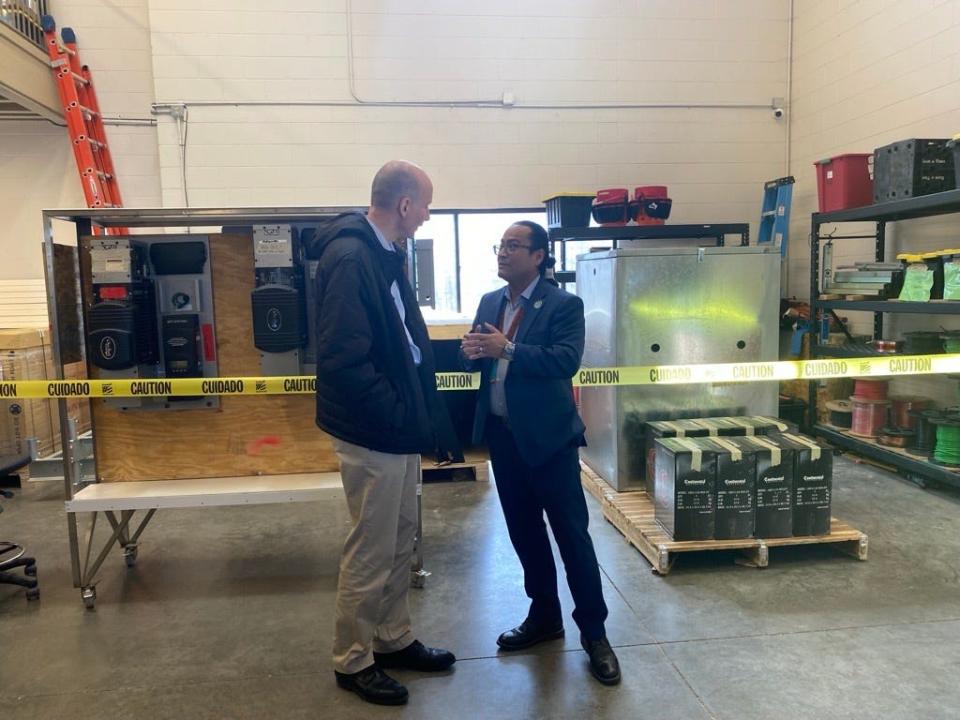Biden administration sends Arizona Indigenous nonprofit $8M to bring power to 300 tribal homes
- Oops!Something went wrong.Please try again later.
FLAGSTAFF — When the local nonprofit Native Renewables Inc. was founded in 2016, it had a long-term goal of eventually growing enough to connect 100 homes across the Navajo and Hopi communities with electricity each year.
In the years since, it's developed an Indigenous workforce that has installed 2.5-kilowatt off-grid solar and battery storage systems in 72 homes across the Hopi and Navajo Nations. While that's a life-changing opportunity for those families, the total is just a fraction of what the organization dreamed about when it first started.
But thanks to an $8 million federal grant, Native Renewables will be able to bring electricity to 300 additional tribal homes. That brings the organization closer than ever to its foundational goal.
Navajo Nation President Buu Nygren and federal Deputy Energy Secretary David Turk were in Flagstaff on Wednesday to celebrate the funding announcement and meet the staff of Native Renewables. They also toured the organization's warehouse, which originally began in an office suite about the size of a residential garage and has since expanded into a new space about four times that size.
Nygren said he "didn't hesitate" to support Native Renewables' mission because "it's one of those things where you're changing people's lives and really improving them."
"It's going to bring electricity to the most remote areas of the Hopi and the Navajo Nation and it's going to bring opportunities to bring families closer together and give them some hope that, 'You know what? Maybe we're not out here all alone. We've got the government that cares about us, we've got our nation that cares about us,'" Nygren said.

The grant represents a small portion of the overall $366 million the Biden administration is investing in energy resources in rural and remote areas, including 30 tribal communities across the country.
"I think that this is a terrific example of democracy actually working," Turk said of the investment.
"The fact that this one grant, this $8 million, will provide 300 homes, 300 families with electricity," he said. "Just that real-world impact is just so humbling, it's inspiring and we just need to do a lot more of that."
Working with the most remote residences
Native Renewables is unique in that it only works with residents who are living off-grid with no electrical lines or public utilities connecting to their properties. It do not charge an installation fee or monthly payments.
If needed, it also work to enhance existing electrical wiring, or install it for the first time to ensure some houses can support the solar technology, according to Native Renewable Deputy Director Chelsea Chee.
The 2.5 kilowatts of power isn't enough to run an air-conditioning unit or a space heater, but can support a small refrigerator and other small appliances. While that might not seem like much to some, it offers an opportunity for many tribal homes to have reliable electricity for the first time.
Deb Tewa, Native Renewables' workforce and education manager, said the system is a "happy medium" allowing the organization to provide some electricity to as many people as possible.
"If we increase our size on our modules, then we lessen the number of deployments out in the field," she said.
Native Renewables works with the residents to educate them on the capabilities and limits of the new system and budget their energy usage based on the appliances and devices they need to plug in, Chee explained.
For some families, 2.5 kilowatts is more than enough because they might only have a few things plugged in, Tewa said. Younger generations typically have more devices that require some electricity.
"We want the families we work with and the recipients we work with to be happy with the system, to know their limits," Chee said.
If they need more power to support their energy use, Native Renewables will work to connect them with other tribal resources that could help.
"We want you to get electricity, but if its not with us that's OK," Chee said.
Building a workforce that understands the need
Founded by two Navajo women, the organization aims to develop its workforce from within the tribal communities it serves. Tewa said that's because "we want them to be able to be totally invested in what we're doing for our Native communities."
"There's a myriad of job opportunities," Tewa said, including electricians, solar installers, communications and more.
A graduate of the organization's first workforce development cohort in 2019, Parvana Lee has now been a solar installer for Native Renewables for about two years. For her, the funding means more steady work for her and her colleagues.
"From an installer's perspective, NRI receiving a grant award means job security for us," Lee said.
Native Renewables currently has less than two dozen employees, all of whom come from Indigenous communities spread across the Southwest. It plans to add more as it continues to grow, in large part boosted by the grant funding.
"It feels good that people support our work and that they're behind us and we get to work with 300 more Navajo and Hopi homes, we get to expand our mission, we get to expand our impact," Chee said.
Reach the reporter at LLatch@gannett.com.
The Republic’s coverage of northern Arizona is funded, in part, with a grant from Report for America. To support regional Arizona news coverage like this, make a tax-deductible donation at supportjournalism.azcentral.com.
This article originally appeared on Arizona Republic: Indigenous nonprofit in Arizona to electrify 300 tribal homes

